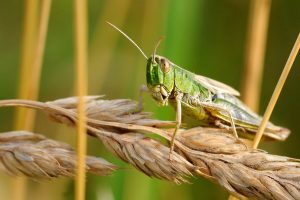The challenge to provide food for families and other groups is taken in stride by most of us in this society; for this we are ever grateful! However, the specter of want in this time of pandemic has led to hoarding as some people look ahead to a grim time of want. This is not a sign of maturity in any society!
As people everywhere face problems in moving crops from the field to the market and table, some countries in East Africa find that a prudent response to the danger of Covid-19 is complicated by another dismal threat. A plague of locusts is an ominous cloud on the horizon and already the first wave has “destroyed a swath of farmland across eight East African nations as large as Oklahoma this year.” Thus began the report, “’Locust-19’ is Set to Swarm East Africa” by Nicholas Bariyo and Joe Parkinson in The Wall Street Journal print edition of April 30, 2020 (p. A 16). After describing the inadequate efforts to spray breeding grounds, the article concludes: “Experts say it is crucial to attack the second swarm before it lays eggs again and a third wave – which could be perhaps 20 times bigger – could arrive in June, the peak harvest season.” This is confirmed by Samini Sengupta’s report, “What a Week’s Disasters Tell Us About Climate and the Pandemic” in The New York Times.
A second wave of locust swarms have also moved into India this week, attacking seasonal crops. The government is monitoring the situation and responding with pesticides, but this will come with other consequences in the long term, as Neeta Lal noted in her article, “India’s Second Plague: Locusts:”
There is no quick-fix solution to the locust menace. Beyond chemicals, pesticides, and drones, it is imperative to tackle the root cause of global warming and invest in upgrading climate resilience and adaptation techniques. An expensive and complex process, this will require global cooperation and coordination. But it has to be done. Else, as these pernicious pests have demonstrated, the costs will be staggering and recurring.
See also “India combats locust attack amid Covid-19 pandemic” by
Emily King’s essay, “Another Plague” in Commonweal, refers to a report by Keith Cressman, the United Nations senior locust-forecasting officer. “The desert locust now threatens the food security of a region that was already contending with intense drought, floods, heavy rains, and war. The emergence of the locust threat, according to Cressman, has the potential to ‘tip the balance into extreme food insecurity’ for these vulnerable countries.”
We think back to the plague of locusts in Egypt (Exodus 10:12-20) and in the land of Israel to the vivid description of flying and creeping swarms by the prophet Joel (chapters 1-2) and express gratitude that we have been spared! Did the author of the New Testament Book of Revelation recall a personal experience of locusts when he recorded the vision of locusts at the fifth trumpet? They arise from the abyss at service of Abaddon, the Destroyer, to torment those who do not have the seal of God on their foreheads (Apocalypse 9:1-11). Such visions of the future are always intended to bring a moral response from listeners in their own time. The challenging question: The reflection of whose image are we impressing into the work that we do?
The fear of famine, especially now in East African nations and India, becomes a second threat to these people who face Covid-19 with far fewer resources than we have. May the agencies of the United Nations take the initiative to help those in need! Besides prayer, you may also want to visit the following websites to learn how you may help:
- The ecumenical initiative, Season of Creation, which encourages a worldwide celebration of prayer and action to protect our common home
- The Subcommittee on the Church in Africa, which is chaired by Cardinal Joseph W. Tobin, CSsR, Archbishop of Newark
- Catholic Relief Services, which is currently providing immediate emergency relief in response to the flooding in Kerala, India and humanitarian work in more than 30 countries in Africa

